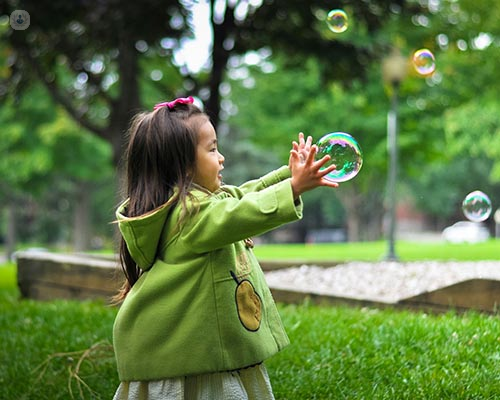A parent’s guide to myopia
Escrito por:As parents, our children's health and happiness are our top priority, and what could be more important than their sight? Poor vision can hold them back from doing things they love and you as parents must be fully informed about common eye health problems like myopia, also known as short-sightedness.
Esteemed optometrist Dr Dilesh Makwana provides a parent’s guide to the condition, including how to spot the signs of myopia in a child, and what can be done to help their vision.

What is myopia?
Myopia, also known as short-sightedness, causes distant objects to appear blurry, making it difficult for individuals to see things like whiteboards or TVs clearly. It occurs when the eye grows too long.
Since children grow rapidly, their myopia can also progress quickly, potentially leading to future eye health issues such as glaucoma, cataracts, and retinal detachments.
What causes myopia?
The primary cause of myopia appears to be modern lifestyles that involve close-range activities, although genetics also plays a role.
The following factors can contribute to the development of Myopia in children:
- Increased screen time.
- Spending less time outdoors.
- Educational demands.
- Urbanisation.
- Genetics.
By 2050, 50% of the global population is predicted to be myopic.
How could myopia affect my child?
Myopia can interfere with a child’s quality of life, making it harder for them to participate in sports, school, and other daily activities. The condition can deteriorate rapidly, particularly in younger children, therefore it is important to start treatment as soon as possible.
It is important to note that myopia can lead to severe eye health problems for a child later in life.
How to spot the signs of myopia in my child?
The principal signs of myopia in a child are as follows:
- Headaches.
- Tired eyes.
- Regularly rubbing their eyes.
- Needing to sit close to screens, such as the TV.
- Struggling to see classroom whiteboards from a distance.
Does my child need regular eye exams?
Yes! As your child grows, their eyes undergo ongoing changes. Regular eye exams are essential for detecting any changes that may affect their vision, and ensuring that their eyes remain healthy in the long term.
What can I do to help my child's eyes?
There are multiple changes you can implement to aid your child’s vision, preventing the onset of conditions such as myopia. The following steps are recommended:
- Encourage your child to play outside, rather than spending all their free time on screens.
- Incorporate a digital detox into your child's weekly routine.
- Sleep is essential; children need around nine hours of sleep a day.
- Encourage children to keep all books and devices at a distance.
Is there a way to prevent myopia from worsening?
There are methods which may prevent the progression of myopia. These include:
- Myopia control glasses-: these are normal glasses with a specially designed lens to control the myopia.
- Nightlenses or Orthokeratology contact lenses: these are contact lenses your child wears overnight. They can remove them in the morning, and therefore they do not need to wear contact lenses or glasses the following day.
- MiSight Contact Lenses- These are soft, daily disposable contact lenses worn during the day.
If your child has been diagnosed with myopia, conventional glasses will make their vision clearer. However, it must be noted that wearing conventional glasses will not slow down the progression of myopia.
If you are concerned about your child’s vision, and would like to book a consultation for them with Dr Makwana, simply visit his Top Doctors profile today


